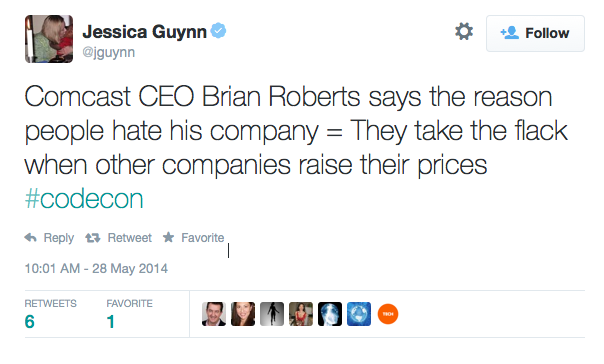Wednesday, at the Code Conference in Los Angeles, Comcast CEO Brian Roberts told an audience of technology executives, analysts and journalists that he’s “trying to change the company.” He has a team comprising more than a thousand software engineers, he said, suggesting the cable provider wants to become a major player in the software development game.
It’s an ambitious goal, even if it does seem a little unlikely. For all of the company’s vast coffers, there’s still one thing it doesn’t have: APIs released to the developer community. There’s no way for outside app makers to work with Comcast’s latest X1 television platform.
Picking up on this, an audience member asked Roberts when that will change. The chief executive offered no date or estimated timeline. Instead, he said, “[It’s] on the road map.”
Vague much?
Developing Frustration
X1 is Comcast’s attempt to beat back the cord-cutting movement. A HTML5-based Internet television platform, it offers a “set-top-box-in-the-cloud” premise—blending live television with streaming and apps—making for Comcast’s most innovative, technologically relevant product yet.
As a product offering, it has had limited test runs up until now, but Comcast hopes to officially roll it out this year. The potential reach could be enormous. According to the New York Times, Comcast currently services 21.7 million total video subscribers.
That raises the stakes for potential developers, particularly if this “road map” actually leads somewhere. It’s a hazy, amorphous promise. Until the company offers some clarity, only one thing is really crystal clear: Comcast isn’t offering outside developers any APIs, or application programming interfaces, to make apps for this X1 platform. Some day, sure. But not now.
It’s baffling, given Roberts’ declaration—especially when you consider that X1 is an emerging platform about to launch in an app-driven world created by the likes of Apple and Google. X1 only has a few applications from outside companies, primarily Facebook and Pandora. Comcast is reportedly pursuing a deal with game company Electronic Arts, but even if it succeeds, those would be streaming games, not apps. As it stands, there’s no Netflix, Hulu, or YouTube, much less apps from smaller developers like Plex. There’s not even an app for Angry Birds, Flappy Birds or any other type of birds.
Of course, Comcast owns the platform, so it can do whatever it wants. But there’s something a bit arrogant about a company that believes it can innovate better on its own (or by cherry-picking partners) than the broader community.
If the company really does want to become something other than the dictator of cable TV and Internet broadband pipes that people think it is—if it wants to step out as a technological innovator—then it needs to do something different. It needs to embrace the developer community.
Comcast should have its APIs ready for launch. At the least, it should plan to ramp up for a quick release shortly after X1 rolls out, sending developers invitations to sign up. Comcast shouldn’t keep developers on the back burner, waiting around until the company gets around to it. Some day. Eventually.
“We Don’t Wake Up Wanting To Be Hated”

Meanwhile, when it comes to the public at large, the cable company sits in the hot seat. ”We don’t wake up every day, and go to work and say, ‘We want to be hated,'” Roberts said in response to a question from an audience member. The topic was Comcast and Time Warner Cable—the object of its acquisition dreams—ranking near the bottom for customer satisfaction.
Glenn Derene, electronics editor at Consumer Reports, believes he knows why: “Everything else in consumer technology is getting more affordable every year—everything except communications services.”
But Roberts clearly doesn’t think that’s the full story. At the Code Conference, he cited his reasoning for the Comcast hate: It’s a consumer-facing company, he said, so it takes the flack when others raise their prices. (The “others” here likely refers to TV studios and networks, and their expensive rights or programming agreements.)
It’s an excuse that’s about as satisfying as “it’s on the road map.” And if it were true, all cable and satellite providers would be in a heated race to the bottom, not just those two.
This issue and the attitude toward developers are fundamentally connected. Comcast has an opportunity to pursue a robust ecosystem, one that welcomes developers and excites customers. Allowing third-party developers to bring their apps and services to X1 would provide more services, features and entertainment to end users. And it could do it without those expensive content deals. Too bad the company appears to be squandering this opportunity to turn sentiment around.
Roberts said he wants to change the company. And he has a pathway to do so. Unfortunately, with arrogance and excuses, it just looks like more of the same.
Comcast was contacted for this article, but as of this writing, had not replied to inquiries.
Image by Owen Thomas for ReadWrite





















